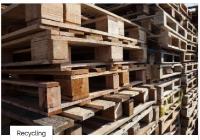 Add My Company
Add My Company
Sign In

A Key Logistics Component
The mantra ‘the best solutions are the simplest’ could easily be used when discussing the humble pallet.
As a key component of modern logistical systems, these wooden wonders aid the storage and transportation of a myriad of materials and products.
Some may have a life of relative ease, while many have anything but. The trials and tribulations of international travel take their toll; digs, dents, breaks and often missing limbs leaving them not fit for purpose.
Apart from constructing structures put to the torch on the 5th of November or up cycling into industrial furniture for an urban loft space, what can be done with pallets once they’ve reached the end of their useful life?
It might be tempting to extend the Guy Fawks celebrations throughout the year and burn your waste wood pallets, however this is neither ecological nor legal, not to mention the latent hazards of burning waste materials. Indeed, a stack of pallets often proves too much of a temptation for a would-be firebug to reveal in the triangle of fire.
The potential for such vandalism and destruction is known only too well by insurers, who typically have caveats and clauses relating to what is and isn’t acceptable for the storage of packing materials, such as pallets and crates, often requiring minimum clear space away from buildings for continuation of cover.
Loading waste pallets into containers, like skips, for removal and disposal off site isn’t particularly efficient, ecological or cost-effective.
Realising the Profit in your Pallets, a Potential Answer
Waste wood products, such as surplus packaging materials, are ideal for conversion into biofuel. It’s possible that fossil fuels will have a future in our energy system, however what form this take is not yet clear. However, whatever it is, it’s likely that peak (in many parts of the World) consumption is in the past, you only have to look at the expanding electrification of passenger vehicles to see this.
Along with alternative energy technologies such as solar and heat-source, biomass presents an opportunity to generate energy which is carbon neutral, but unlike other carbon neutral energy biomass can convert materials which might otherwise be destined for landfill.
How It’s Done?
Although pallets might end up in a poor state of repair that doesn’t mean that they’re easy to break-up, after all a product designed to do what a pallet needs to do, has to be incredibly robust.
A correctly specified shredder, with associated features will enable the conversion of bulky pallet waste into a biomass fuel, that is uniform and easy to handle.
However, when considering this specific material waste stream, you have several options regarding the size of shredder, you either look at a shredder which can accommodate complete pallets or a smaller shredder where the pallets must first be reduced in size. This is really dependent upon the volume of pallets you need to handle. It is often the case that shredders which are capable of accommodating material whole, often have a greater throughput capacity than is required and typically represent an extended return on investment.
Whether full parts are first broken down, it’s important to ensure that the machine performs at its optimum with minimal issues of blocking and bridging.
More Than Just Wood
Although pallets mainly consist of timber, their construction is reliant upon mechanical fixing methods including nails, screws and bolts, all of which when liberated represent another material which can generate income from selling on for recycling.
When Budgets Don’t Allow
Along with new equipment we also have an ever-changing stock of pre-owned shredders and briquette presses. These typically cost somewhere between half and two thirds of the cost of a new machine, based upon whether they are simply used or fully refurbished (when such machines are stripped right back to bare metal and then rebuilt from the ground up with all parts which require replacement replaced).
Ask one of our experts to help build your perfect shredder.
About Fercell
For over 40 years we have focused on delivering innovative solutions for the individual needs of our customers, for applications such as plastic, paper, wood and metal. We support the whole manufacturing journey, offering a range of size reduction systems through to innovative products and services to extract dust, spray fume and gas. Our team also undertake occupational hygiene tests including CoSHH assessments.
For more information contact us on +44(0)1622 791414 or email info@fercell.com.
For more information on Unsure what to do with your unwanted pallets? talk to Fercell Engineering Ltd
Enquire Now
List your company on FindTheNeedle.
